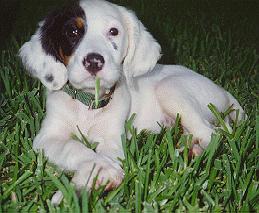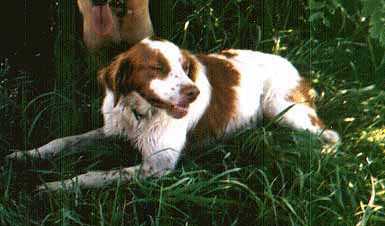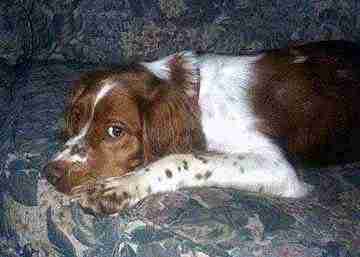Bird Dogs...
Quail...
Resources...
Library...
Dog Training Collars
Tri-Tronics
SportDog
Dogtra
Innotek
Help a Bird Dog
this article appears in the May/June 2000 issue of The Pointing Dog Journal under the title "To the Rescue"
To those of us who see our dogs as more than just a tool to find and retrieve game, there is not a more sullen picture than the bird dog who has been abandoned by his owner, left to wander streets and fields, scavenging for food and making his bed by the roadside. This picture is more widely published than most of us would like to admit, but many of these misplaced animals are receiving a second chance through programs appropriately referred to as rescue organizations. All of the major sporting breeds, including labs, pointers, setters and brittanies, are represented, and there are surprising benefits to sportsmen in developing relationships with these groups.
Rescue organizations serve three primary functions: (1) getting dogs off of the streets and out of shelters (2) providing temporary housing for these dogs and (3) matching dogs with compatible new owners. The first two are a means to the third, which is the ultimate goal for any dog placed in the program. Rhonda Carlson, National Coordinator for American Brittany Rescue says, "..we are looking for homes for our dogs where they can be more than kennel dogs. We expect them to be part of the family." Jennifer Stastny of the Lone Star English Setter Club echoes this sentiment. She says, "I like to place dogs in homes where they will be treated as a member of the family and not just placed out in a kennel or backyard. Being a member of the family is the biggest need of any English Setter." Many of us have dual purpose bird dogs, and by dual purpose I do not mean pointing and retrieving. On the 300+ days a year that they are not in the field, they serve as walking companions, therapeutic listeners, bed warmers, vacuum cleaners, childrenís playmates, and a host of other vocations.

|
Lone Star English Setter Club |
The national organizations may place 150 dogs or more a year, with most of these being between one and three years of age. Last year the Lone Star English Setter Club either directly placed or assisted in the placement of 22 dogs that were field-quality. According to Stastny, some of these "have been abandoned because supposedly they canít hunt. We have had club members who are experienced trainers and hunters take these dogs out and they are just great. All it took was someone who knew what they were doing and did it with love instead of abuse." Unfortunately, far too many of the dogs that end up in the program are there because of heavy-handed owners who did not get the results they expected.
This leads us to one of the larger benefits these programs offer hunters. While many of us prefer to choose dogs from a litter of newborns and work with them from an early age, others do not want to go through the trying times that go hand in hand with puppies. Reverse cobblery, small yellow indoor ponds, custom-ventilated undergarments- many people find themselves at a point in life where these items lack the "cute factor" they once carried. A dog with hunting instinct who has grown out of this adolescent behavior offers a way around these inconveniences. These dogs may still require some work, as Karin Ashe of the American Pointer Club is quick to note. "There is the factor that the dog may have been mistrained and must be re-trained for his hunting abilities." She adds, "anyone adopting a Pointer must realize that they are not always getting an Ďinstantí bird dog." For those of us who consider training our dogs to hunt in our own style an integral part of ownership, this is an enormous plus.

|
American Brittany Rescue |
There are also those among us who would love for our hunting companions to have a companion of their own, and in situations such as these the rescue programs truly shine. The programs are full of good-looking, well-socialized dogs that, while they may not come from strong hunting stock or have any field training, make excellent family pets. Chris Mills, a volunteer with English Setter rescue, told me of a dog she recently placed with an elderly woman whose husband had been moved to a nursing home. "Her words to me were, ĎI think he rescued me, not the other way around.í" Generally, these dogs have been evaluated at foster homes such as Chrisí and volunteers will have a detailed profile of how the dogs interact with other dogs, with children, with their environment, and of any special needs the animals may have.
One other thing to keep in mind if youíre considering adopting a rescued dog: all of the rescue programs require that dogs placed through them be spayed or neutered. This is a policy in virtually every animal shelter in the country, and its goal of controlling the number of animals entering shelters is shared by the rescue programs.
As a prospective owner, you will be evaluated extensively by rescue volunteers. Applications may contain questions concerning your history with dogs, how many children you have, where the dog will spend days and nights, whether or not your yard is fenced, and what you would consider a legitimate reason for giving up a dog. Volunteers will want to meet you and may ask to visit your home before the adoption is approved. None of this is done in the name of bureaucracy or simply to fill up the spare time of the volunteers. To the contrary, volunteers are often overworked, and the purpose of such an intense interview is to make certain that the dogís next home will be his permanent home. Not only does this result in happier dogs and owners, it reduces the burden on the volunteers as well.
What can I do to help?

|
American Brittany Rescue |
Many of us simply donít have room in the home for another dog, but program coordinators insist that adoption is not the only way that sportsmen can help. Even programs that run primarily on volunteer effort have financial needs, and donations are always welcomed. Veterinary and phone bills, food, and transportation costs consume a large portion of each programís budget, and these costs rise as more and more dogs are rescued and placed.
Most dogs are placed in foster homes between the time they are found and when they are placed in permanent homes. These foster homes reduce the dependence on shelters and allow the dog to live among people, providing an excellent opportunity for evaluation and auxiliary training. Hunters can provide an extra benefit to programs that ordinary foster homes cannot. Rhonda Carlson says, "I would really love to have sportsmen who know and understand Brittanies who would be willing to foster them for 3-4 weeks and evaluate their hunting ability." Most of the coordinators I interviewed insisted that practicing and encouraging responsible breeding is one of the least expensive yet most beneficial contributions that sportsmen can make. Breeders who truly care about their dogs and are willing to take them back if an owner changes his mind will significantly reduce the number of animals that are abandoned or face euthanization by shelters. If you would like to help in any way, please contact the rescue group for the breed or breeds that interest you.
The internet has proven an invaluable resource for the rescue organizations. I strongly suggest that you visit these sites:
American Brittany Rescue (http://www.brittanyrescue.com)
Rescue site for the American Pointer Club (http://www.PointerRescue.org)
German Shorthair Pointer rescue (http://www.gsprescue.org)...a very nice site
Whether you're looking to add another dog to your household or simply can't bear to see an animal like yours suffer needlessly, the organizations profiled here offer an opportunity to help. At the very least, visit a few of the web sites and read more about the wonderful yet thankless work
they are doing.
 Windows users press "CTRL+P" to print this page.
Windows users press "CTRL+P" to print this page.
 Mac users press "Apple/Loop+P" to print this page
Mac users press "Apple/Loop+P" to print this page